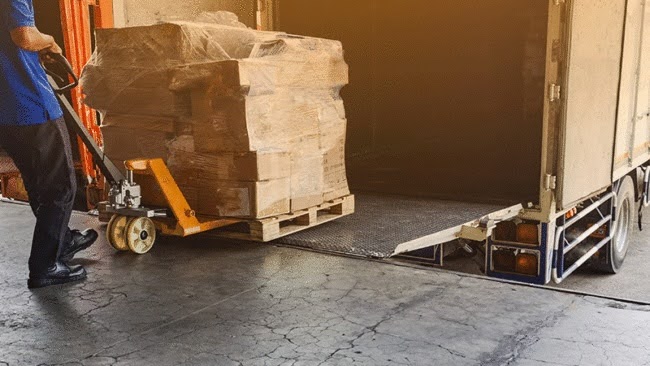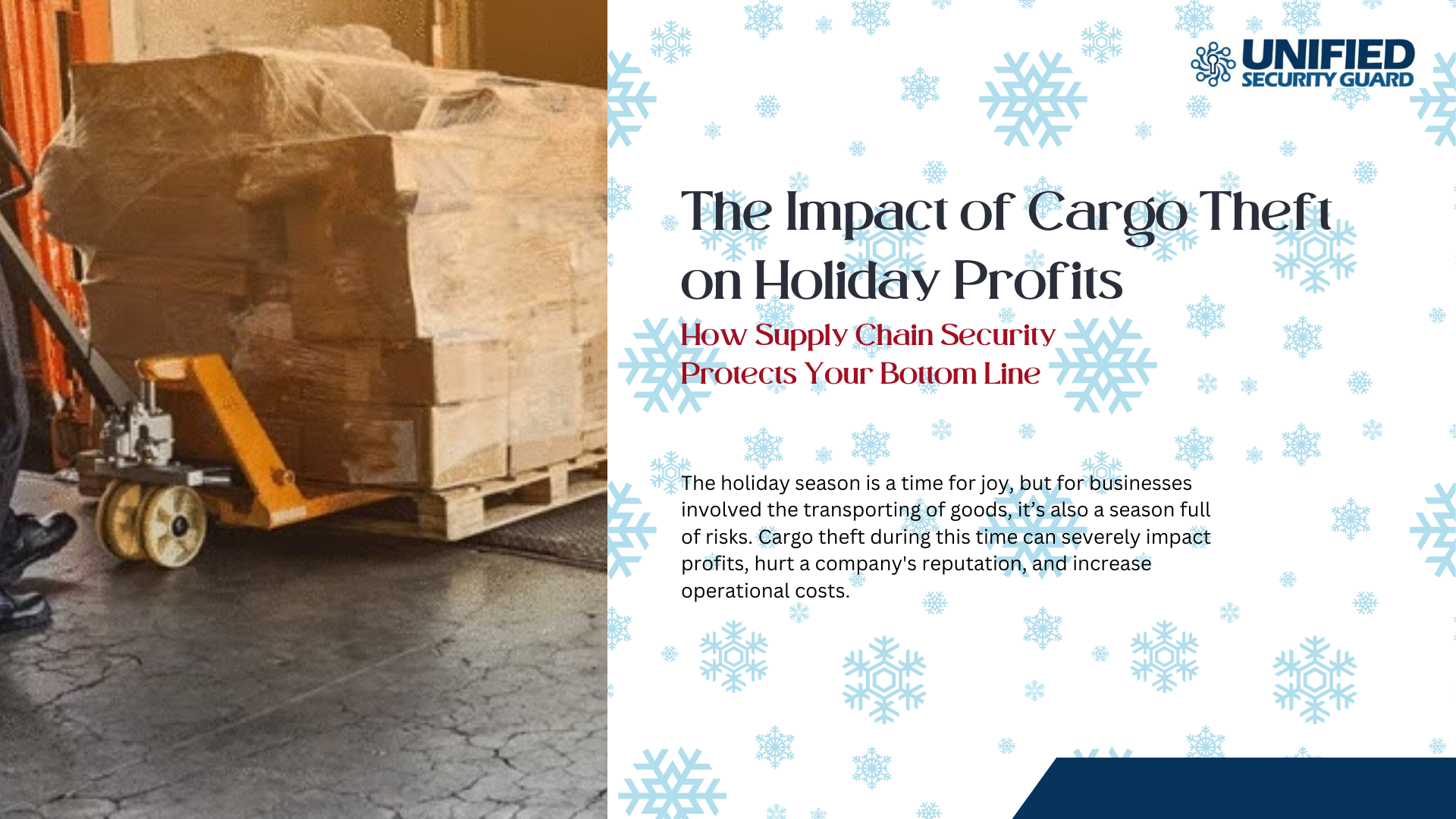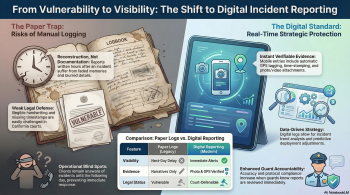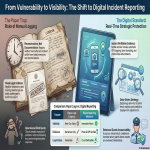Why Holiday Theft Spikes: A Seasonal Risk for Businesses
The holiday season brings a surge in the volume of goods being transported across the country and globally. While this can lead to increased profits for businesses, it also opens the door to higher risks, including cargo theft. Let’s look at why theft tends to spike during the holidays:

1. High Volume of Goods in Transit
The holiday shopping rush results in high volumes of products being shipped
and delivered. From electronics to toys and clothing, many goods are in
transit, making them a prime target for thieves. When cargo volume increases,
it becomes easier for criminals to blend in and steal goods without getting
caught.
2. Congested Supply Chains
With so many shipments moving during the holidays, supply chains often
become congested. This congestion makes it difficult to track and manage goods
efficiently. In such chaotic conditions, it’s easier for criminals to steal
cargo unnoticed, especially if there are delays or disruptions.
3. Demand for High-Value Goods
During the holiday season, the demand for high-value goods like electronics,
luxury items, and popular toys peaks. These high-demand items are particularly
attractive to thieves looking to make a quick profit. As a result, businesses
dealing with these items must be extra cautious.
4. Reduced Security Resources
With the increase in shipments, many businesses may cut back on security
measures to focus on other aspects of holiday operations. However, this leaves
their supply chains vulnerable to theft. Criminals often target weak points
where security is less stringent, taking advantage of the reduced resources
during the busy season.
The Financial Impact of Cargo Theft
Cargo theft isn’t just a logistical problem—it’s also a significant
financial risk. Businesses lose millions each year due to cargo theft, and the
holiday season is no exception. The financial impact of cargo theft
can be devastating and far-reaching. Let’s explore some of the key ways theft
affects a company’s finances.
1. Inventory Loss
When goods are stolen, the immediate loss is obvious: inventory that was
supposed to be delivered to customers is gone. This creates a gap in your
inventory, which can delay shipments and affect customer satisfaction.
Inventory loss also means a direct loss of potential sales, impacting the
overall bottom line.
2. Increased Operational Costs
Cargo theft often leads to higher operational costs. Businesses may need to
spend additional money on logistics to replace stolen items, expedite
shipments, or find alternative ways to deliver goods. This also results in
increased operational stress, as employees are forced to deal with the
aftermath of theft.
3. Insurance Premium Increases
After a theft, businesses typically file insurance claims. While insurance
can cover some of the losses, it doesn’t come without consequences. As
businesses face more claims, their insurance premiums can rise, increasing
operational expenses even further.
4. Damage to Reputation
Cargo theft also harms a company’s reputation. Customers expect timely and
secure deliveries, especially during the holidays. If theft occurs and
customers’ orders are delayed or canceled, they may lose trust in the company.
This can damage the relationship with customers, leading to long-term
reputational harm and loss of business.
Protecting Your Bottom Line: Supply Chain Security Measures
The impact of cargo theft on holiday profits can be reduced
significantly with a strong supply chain security strategy. Below are some
proven measures that can help protect your business from theft, ensuring your
bottom line stays intact.
1. Employee Training and Awareness
The first line of defense against cargo theft is your employees. Properly
trained employees are crucial for spotting suspicious activity and preventing
theft before it occurs. Regular training and awareness programs can help
workers identify potential threats and respond quickly.
2. Enhanced Security Screening
Implementing enhanced security screening processes at every
point in the supply chain—from warehouses to trucks—can help identify and
prevent theft. Screening should include background checks for employees,
regular inspections of cargo, and security audits of transportation facilities.
3. GPS Tracking and Monitoring
GPS tracking devices can be placed on shipments to provide
real-time monitoring. If goods are stolen, GPS tracking allows you to quickly
locate and recover them. This can also serve as a deterrent, as thieves are
less likely to target shipments that can be easily traced.
4. Secure Loading and Unloading Areas
Ensuring that loading and unloading areas are secure is
critical. Well-lit, fenced-in areas with monitored security cameras can deter
thieves from attempting to steal cargo. Additionally, having a presence of
security personnel in these areas can help prevent theft.
5. Implementing Security Personnel
Hiring professional security personnel to guard shipments
during transportation and storage can make a significant difference. Security
guards can keep watch over high-risk areas, ensuring that goods are properly
secured and preventing unauthorized access.
6. Routine Route Audits and Schedule Variations
Routine audits of delivery routes can help identify
potential security weaknesses. In addition, varying the schedules of shipments
can throw off criminals who may try to predict delivery times and locations.
Keeping thieves on their toes can reduce the risk of theft.
7. Partnering with a Professional Security Service
Partnering with a professional security service that
specializes in cargo theft prevention can offer an added layer of protection.
These services can provide expertise, advanced technology, and resources to safeguard
your supply chain.
Additional Tips for Effective Security During the Holiday Season
During the holiday season, additional security measures
should be in place to account for the increased volume of goods and the higher
risk of theft. Here are some effective security tips:
1. Inventory Control Measures
Implement strict inventory control measures to track goods
at all times. Using barcodes or RFID technology allows businesses to monitor
the movement of goods throughout the supply chain, ensuring nothing goes
missing.
2. Layered Security Protocols
Layered security protocols involve using multiple forms of
protection at each step of the supply chain. Combining physical security with
technology like GPS tracking and security cameras ensures a more comprehensive
approach to safeguarding goods.
3. Review and Adjust Security Plans
With the holiday season fast approaching, it’s important to review
and adjust your security plans. Make sure your security protocols are
up to date, and adjust them based on new risks or threats that may arise.
Final Thoughts
The impact of cargo theft on holiday profits is a serious
concern for any business involved in shipping goods. During the holiday season,
the risks of theft are heightened due to increased shipments, congested supply
chains, and the demand for high-value products. However, by implementing strong
supply chain security measures, businesses can protect their
bottom line and avoid the financial and reputational damages caused by theft.
Investing in supply chain security is an investment in your company’s
future. With the right security protocols in place, you can ensure that your
products reach your customers safely and on time—allowing you to focus on what
matters most: growing your business.
FAQs
1. What is cargo theft, and how does it impact businesses?
Cargo theft involves the stealing of goods while they are in transit or
stored in warehouses. It can result in significant losses, increased costs, and
reputational damage for businesses.
2. Why does cargo theft increase during the holiday season?
The holiday season brings higher shipment volumes, increased demand for
valuable goods, and often reduced security resources, making cargo theft more
common.
3. How can businesses prevent cargo theft during the holidays?
Businesses can prevent theft by implementing enhanced security measures such
as employee training, GPS tracking, secure loading areas, and professional
security personnel.
4. What are the financial consequences of cargo theft?
Cargo theft leads to inventory loss, increased operational costs, higher
insurance premiums, and damage to a company’s reputation.
5. What security measures should businesses focus on for holiday shipments?
Key security measures include employee training, enhanced screening, GPS
tracking, routine audits, and partnering with a professional security service.











